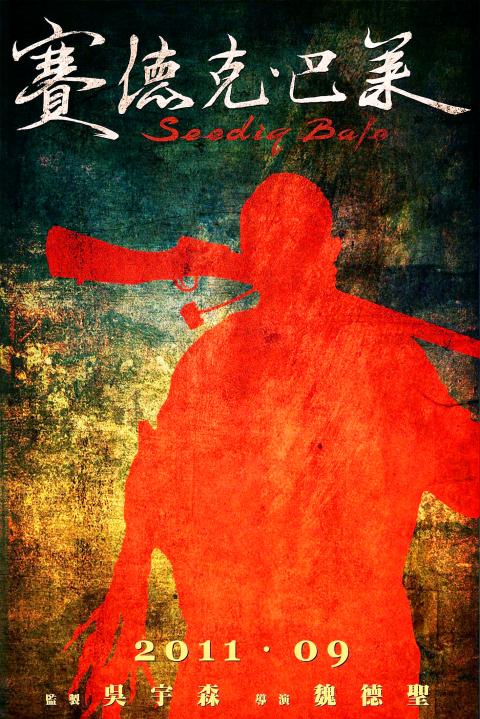The nation’s first epic feature film directed by Wei Te-sheng (魏德聖), the maker of the blockbuster hit Cape No. 7 (海角七號), will hit theaters in two parts in September.
After the success of Cape No. 7, which enjoyed the second--biggest box office sales in the nation’s cinematic history, Wei has spent at least NT$600 million (US$20.7 million) to make Seediq Bale (賽德克巴萊).
The epic is based on the most famous and most violent of the anti-Japanese uprisings during the nation’s Japanese colonial period, know as the Wushe Incident, in which Sediq hero Mona Rudao led his tribe in a rebellion against Japanese military forces in 1930.

Photo provided courtesy of ARS Film Production
The incident occurred in what is now Renai Township (仁愛), Nantou County.
The Sediqs are the nation’s 14th officially recognized Aboriginal tribe and have a population of between 6,000 and 7,000.
Featuring a cast of 15,000 and produced by a 400-person technical production crew from Taiwan, Japan and South Korea, Wei said that Seediq Bale was in post--production and would be released in two parts.
The first part, scheduled to be released on Sept. 9, will center on the portrayal of the major characters and the atmosphere of the colonial era. The second part, to be released on Sept. 30, will revolve around the uprising of the Sediq tribe and its suppression by the Japanese army, the director said.
Each part will run for at least two hours, he said.
“Seediq Bale means ‘a real man’ in the language of the Sediq. I am truly grateful for the dedication that my crew showed. Without them, it would never have been possible for me to create this world-class Taiwanese epic feature,” Wei said on Friday.
Despite the huge budget for a local production, some of the crew were not paid for as much as two months of work during the 10-month shoot.
Wei will meet his fans on Feb. 12 and Feb. 13 at the Taipei International Book Exhibition at the World Trade Center.

Alain Robert, known as the "French Spider-Man," praised Alex Honnold as exceptionally well-prepared after the US climber completed a free solo ascent of Taipei 101 yesterday. Robert said Honnold's ascent of the 508m-tall skyscraper in just more than one-and-a-half hours without using safety ropes or equipment was a remarkable achievement. "This is my life," he said in an interview conducted in French, adding that he liked the feeling of being "on the edge of danger." The 63-year-old Frenchman climbed Taipei 101 using ropes in December 2004, taking about four hours to reach the top. On a one-to-10 scale of difficulty, Robert said Taipei 101

A preclearance service to facilitate entry for people traveling to select airports in Japan would be available from Thursday next week to Feb. 25 at Taiwan Taoyuan International Airport, Taoyuan International Airport Corp (TIAC) said on Tuesday. The service was first made available to Taiwanese travelers throughout the winter vacation of 2024 and during the Lunar New Year holiday. In addition to flights to the Japanese cities of Hakodate, Asahikawa, Akita, Sendai, Niigata, Okayama, Takamatsu, Kumamoto and Kagoshima, the service would be available to travelers to Kobe and Oita. The service can be accessed by passengers of 15 flight routes operated by

Taiwanese and US defense groups are collaborating to introduce deployable, semi-autonomous manufacturing systems for drones and components in a boost to the nation’s supply chain resilience. Taiwan’s G-Tech Optroelectronics Corp subsidiary GTOC and the US’ Aerkomm Inc on Friday announced an agreement with fellow US-based Firestorm Lab to adopt the latter’s xCell, a technology featuring 3D printers fitted in 6.1m container units. The systems enable aerial platforms and parts to be produced in high volumes from dispersed nodes capable of rapid redeployment, to minimize the risk of enemy strikes and to meet field requirements, they said. Firestorm chief technology officer Ian Muceus said

MORE FALL: An investigation into one of Xi’s key cronies, part of a broader ‘anti-corruption’ drive, indicates that he might have a deep distrust in the military, an expert said China’s latest military purge underscores systemic risks in its shift from collective leadership to sole rule under Chinese President Xi Jinping (習近平), and could disrupt its chain of command and military capabilities, a national security official said yesterday. If decisionmaking within the Chinese Communist Party has become “irrational” under one-man rule, the Taiwan Strait and the regional situation must be approached with extreme caution, given unforeseen risks, they added. The anonymous official made the remarks as China’s Central Military Commission Vice Chairman Zhang Youxia (張又俠) and Joint Staff Department Chief of Staff Liu Zhenli (劉振立) were reportedly being investigated for suspected “serious